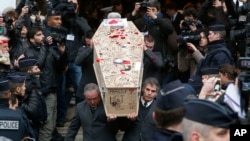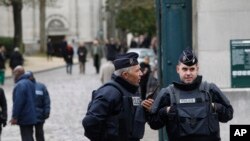U.S. Secretary of State John Kerry is in Paris to give what he has called a "big hug" to the French capital after last week's terror attacks by Islamic extremists.
The White House has admitted it made a mistake by not sending a high-level representative to a massive anti-terrorism march in Paris Sunday that attracted other world leaders.
Kerry said he wants to express the affection of the American people for France which, he said, has been through a terrible time.
Two more funerals for victims of the January 7 Charlie Hebdo massacre were held Thursday – for cartoonists Georges Wolinski and Bernard Verlhac, who used the pen name "Tignous."
They were among the 12 murdered by two Islamic extremist brothers, Said and Cherif Kouachi, who were killed in a raid Friday by French police. The Yemeni-based terrorist group al-Qaida in the Arabian Peninsula has asserted responsibility for the brothers’ attacks.
They’re linked to Amedy Coulibaly, another Islamist militant who was shot dead in a second, nearly simultaneous police raid after he’d taken hostages at a Jewish supermarket in Paris Friday. He killed four hostages, as well as a policewoman a day earlier. In a video, he'd claimed allegiance to the Islamic State group.
Moderate Muslims called main victims
On Thursday, French President Francois Hollande said a crisis such as the shootings at Charlie Hebdo – a weekly publication known for satirizing Islam, other religions and other targets – can serve to undermine confidence or awaken people to, in his words, "shout their message all the louder."
Hollande, speaking at the Arab World Institute in Paris, said the whole country was "united in the face of terrorism."
He also identified moderate Muslims as the primary victims of radical Islam.
"Radical Islam fed itself with all the contradictions, influences, poverty, inequalities, conflicts, unresolved for a long time," Hollande said. "And it is the Muslims who are the first victims of fanaticism, fundamentalism and intolerance."
Islam can be compatible with democracy, said Hollande, who called fundamentalist Islam fanatical and intolerant.
Also Thursday, France's top cyberdefense official, Admiral Arnaud Coustilliere, said hackers – including some self-described Islamists – have attacked thousands of French websites in the past week. They've focused largely on small businesses and local public institutions like universities and churches.
The three days of violence triggered France to deploy thousands of troops to boost security on its streets.
Hollande also announced the country is sending its top aircraft carrier to the Middle East in a public show of increased commitment to the anti-Islamic State air campaign.
Suspect in Spain
Elsewhere, Spain's High Court on Thursday ordered an investigation into Coulibaly's movements in the country just days before he launched the supermarket attack.
During his stay in Spain, Coulibaly was accompanied by girlfriend Hayat Boumeddiene and a third party, who could have aided the latter's escape to Syria, the High Court said in a statement.
Coulibaly spent December 30-Jananuary 2 in Madrid with Boumeddiene, who later went to Syria, traveling through Turkey, state security sources told La Vanguardia newspaper. Coulibaly returned to France on January 2, accompanied by a third party, the paper said.
Interior Minister Jorge Fernandez Diaz said Spain is cooperating with French officials in the investigation, but he declined to confirm whether Coulibaly had been in Madrid or say whom he could have been in contact with.
Reprint backlash
Backlash continued against the magazine's latest issue, released Wednesday. Pakistan's lower house on Thursday officially condemned the publication.
Islamabad denounced the terror attacks, as did other Muslim-majority countries.
But the illustrations of the Muslim Prophet Muhammad, including a drawing on the cover of the latest Charlie Hebdo issue, are an ongoing source of outrage. Depictions of the prophet are banned by Islam.
Kenya's newspaper The Star and South Africa's Citizen apologized Thursday to Muslim readers after reprinting the controversial cover.
Senegal has banned the magazine; President Macky Sall took part in last Sunday's unity march in Paris alongside the French president.
And in Istanbul, prosecutors announced Thursday they are investigating Turkey’s Cumhuriyet newspaper for "inciting people to hatred or humiliation," after it published excerpts of the latest edition of Charlie Hebdo.
Some material for this report came from Reuters, AP and AFP.






